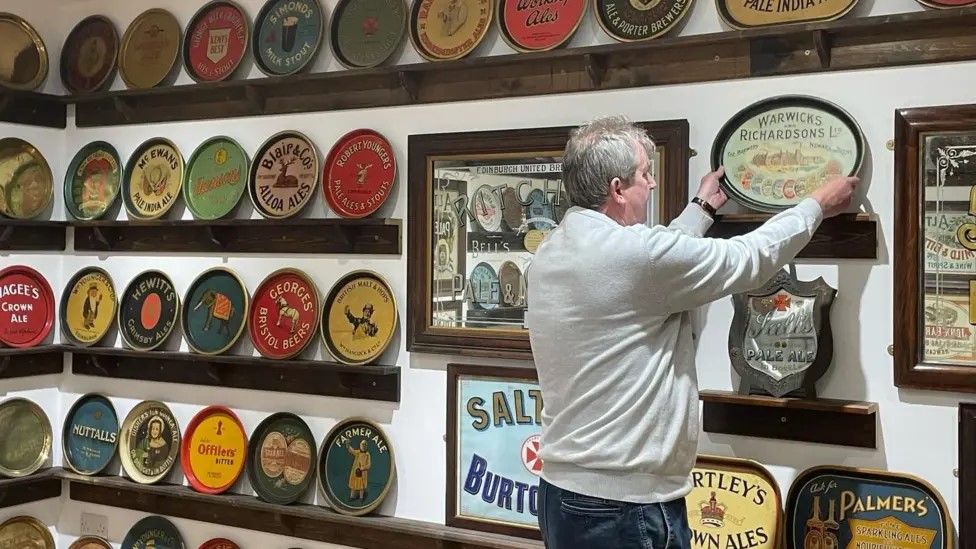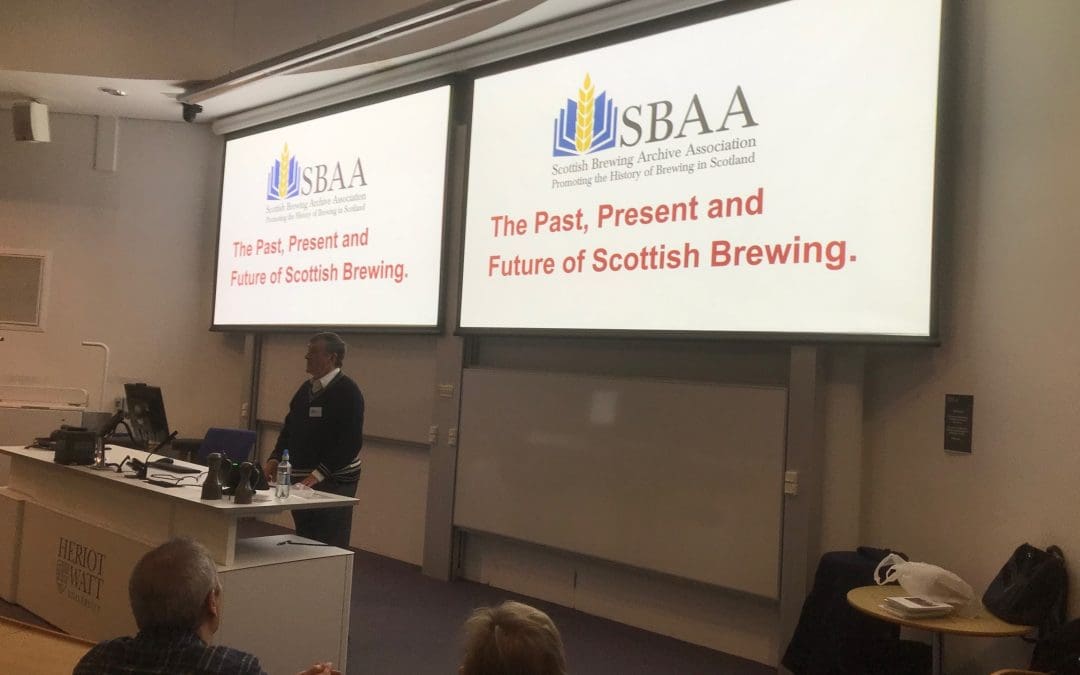1. Sir Geoff Palmer in Conversation at Stewart Brewing
As part of the Midlothian Science Festival, Stewart Brewing held an event titled Sir Geoff Palmer OBE in Conversation.
Sir Geoff was joined by former student, Steve Stewart, co-founder of Stewart Brewing to discuss the science behind beer, and what a great evening it was.
By answering questions from Steve, Sir Geoff outlined his working career and explained in some detail his research into barley including the technique of barley abrasion that he discovered, which saved the brewing industry a great deal of money, at that time.
In the second half of the talk, Sir Geoff and Steve invited questions from the audience.
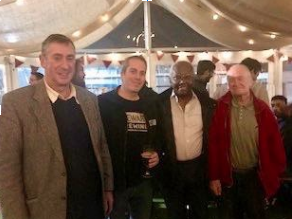
It is also great to see the success that Stewart Brewing had at the Scottish Beer Awards held a few weeks ago. The brewery not only won the Scottish Brewery of the year again but also 7 other awards as follows,
- Product Development Team of the Year
- Exporter of the Year
- Silver in Best Lager for Franz
- Gold in Best British Style Ale for St Giles
- Gold in Best IPA Bright Lights with Lidl GB
- Silver in Best IPA for Radical Road
- Bronze in Best IPA Big City with Lidl GB
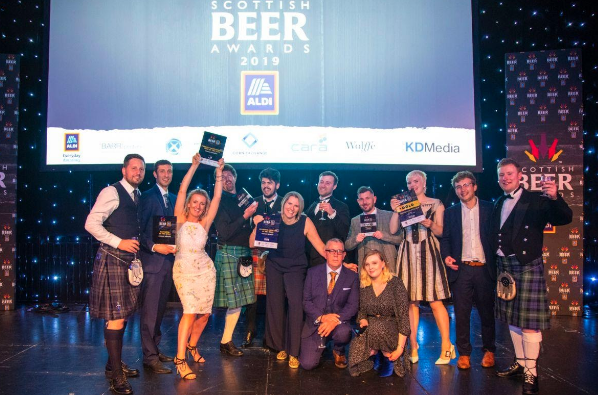
2. HAPPY BIRTHDAY, BELHAVEN!
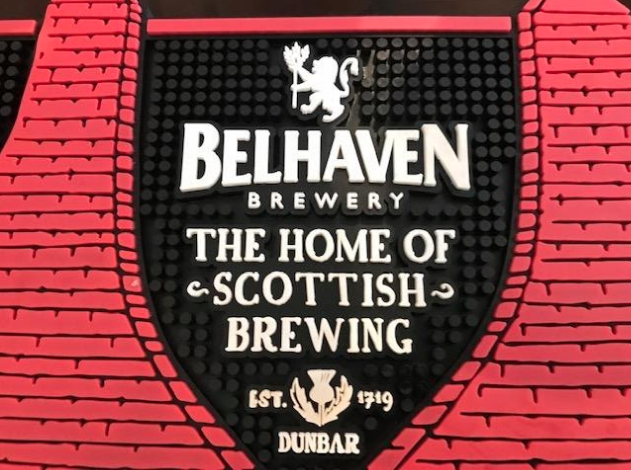
This year, Belhaven Brewery in Dunbar is celebrating its 300th anniversary. The name Belhaven means ‘beautiful harbour’ and the brewery was established in 1719 by John Johnstone. It is Scotland’s oldest working brewery and was run by the same family until 1972. Today it is part of the Greene King group. The building is now Grade II Listed, but a £1m upgrade in 2011 brought in new vessels and modern technology to run the show. The visitor centre is also currently undergoing a comprehensive refurbishment.
The brewery is rightly proud of its many awards, including the two recently won at The Scottish Beer Awards 2018 – Beer Exporter of the Year and Beer of the Year (Twisted Grapefruit). They have recently produced a 1719 IPA anniversary brew, and a 90/- Wee Heavy, but their best-seller is Belhaven Black. You can view their full range on their website at https://www.belhaven.co.uk/our-beers
To celebrate this special year, John Martin organised a trip to the brewery. For the seven of us travelling from Edinburgh, the day turned out to be more of an adventure than had been anticipated. This was due to the X7 bus being 30 minutes late in picking us up. A very slow progress along Princes Street, due to the Edinburgh Festival, ended with the bus driver telling us that we had to get off the bus and get the next one, as he was finishing his shift. We got on the next bus, but this meant that we were running seriously late. We eventually arrived at the brewery about 45 minutes later than planned, to meet up with four other SBAA members who had made their own travel arrangements. Our Tour Guide, Tom Carmichael, had already started his introductions with some others.
However, all was not lost and our first treat was seeing the original copper mash tun and cast-iron water tank used by the brewery. The mash tun was a truly beautiful sight and much more characterful than its shiny, new, modern replacement. In the same room as this now museum piece are a bank of state-of-the-art computers, controlling many of the brewing processes. We were then led into a fairly small room, which was stiflingly hot, because in there were the new mash tun and lauter tun. We were able to see the mash being sparged in the lauter tun, which for a newbie like myself was rather exciting!
Although small in size, the brewery is capable of making 4 brews per day, with 180 barrels per brew – a whopping 51,840 pints! An inbuilt cleaning and flushing facility allows 4 different beers to be made in the same vessel over the course of the day. Due to the lateness of our arrival, the tour was, sadly, cut short, so we were then led into The Monk’s Retreat – the brewery’s bar, where we were all treated to ‘a wee refreshment’.
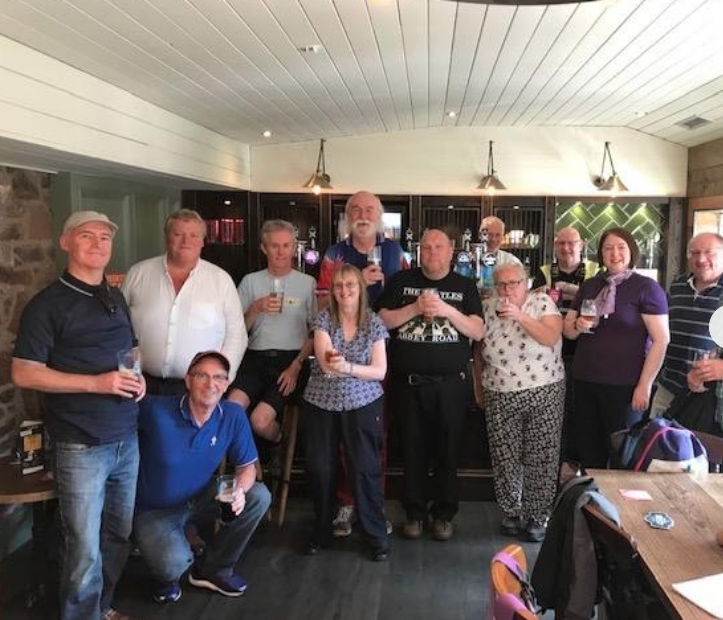
3. McEwan’s card advertisements
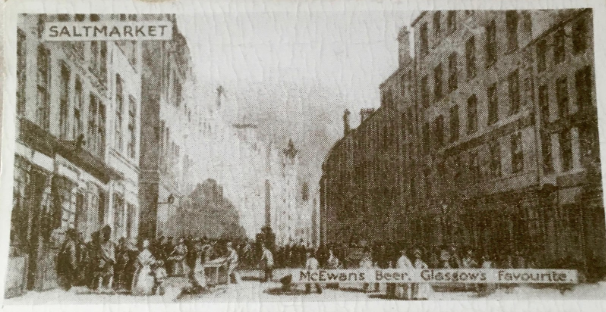
The SBAA were grateful to receive an enquiry from Iain Houston enquiring about small cards he had received that portrayed a number of places in Glasgow and with a brief description on the reverse and with the name Wm. McEwan & Co. Ltd, promoting McEwans Export Ale.
Has anyone seen any similar cards promoting beers?
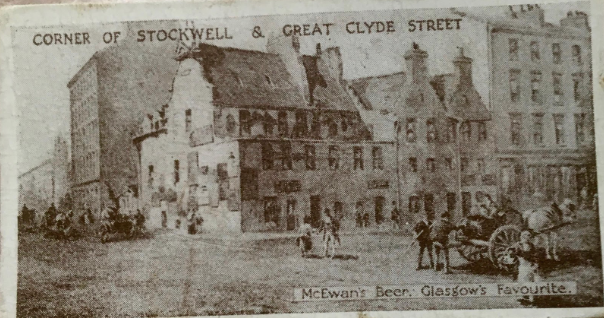
4. Tour of Barney’s Brewery, Summerhall, Edinburgh
Summerhall, situated at the eastern end of The Meadows in central Edinburgh, has long been the scene of brewing activity, being initiated by Robert McClellan in 1705 or thereabouts. Eight members of the SBAA gathered there on 30th July (it would doubtless have been more but for several likely candidates having visited previously). Entering the main building was not like a visit to a normal brewery, for it is a large and sturdy Neo-Classical structure ~ what one architectural critic rather unkindly called ‘fag-end Wrenaissance’. Our venue, however, was round the back, in a less grandiose brick-built shed, one of a row situated in the old coopers’ yard (the reason being that with the mansion-style building barely half-finished, so many masons went off to the First World War that it had to be completed in more modest fashion).
Our guide was the bubbly Jenny of ScotBeer Tours, who explained that the first brewery here did not last long, being burned down by a spark drifting from a blaze in the Old Town (those who find such an explanation slightly implausible may be interested to know that rumours of arson still persist). The brewery was restarted, however, and proved successful, notably during the tenure of Robin Macmillan & Co., though it had to shut down to allow the grand new building to operate as the Royal (Dick) College of Veterinary Science. Eventually ceasing to play that role, it is now used as an arts centre venue, with the accommodation at the rear home to various pursuits, including brewing once more.
Barney’s Brewery was established in 2012, the man in charge being Andrew Barnett from Wolverhampton. Having started as a 16-year-old working in a maltings (‘to keep him out of trouble’, according to his mother, allegedly), he completed the Heriot-Watt brewing course and decided to go independent. A small team now operates in tiny premises, with the usual equipment, mash tun and all, being of modest size ~ this works advertises itself as Edinburgh’s only micro-brewery, after all. Some excitement was aroused among the technically-minded in the group by the hop-rocker device. Jenny treated us to the customary pursuits of grain-nibbling and hop-sniffing (as I hadn’t managed lunch that day, I munched through a fair fistful of well-toasted barley ~ yummy), before heading off to the sampling room.
Having half a dozen beers laid out for our enjoyment provided an opportunity to appreciate the range of production at Barney’s, which can be more than double that number, though brewed in small batches, storage space being very limited. The bottling is outsourced, being done in Alloa we were told, though afterwards I learned from Mhari, the Barney’s ‘brand ambassador’, that it is now carried out at Cockermouth in Cumbria. The bottles are all of the small 330ml sort. The tasting was carried out without informed analysis being provided, in a rather puzzling sequence which had two of the strongest coming in the first three. The samples are listed below in ascending order of ABV.
- ‘Good Ordinary Pale Ale’ at 3.8%;
- ‘Cool Beans’ IPA at 4.2% (previously ‘Fee-Fi-Fo-Fum’), comprising 40% Faba beans, which are late-growing and therefore not in need of fertiliser, making them eco-friendly (this being a collaboration with Abertay University and their sustainable agri-food programme);
- ‘Red Rye’ at 4.5%, containing six different malts;
- ‘Volcano’ IPA at 5.0%, named after the adjacent extinct volcano of Arthur’s Seat, and also being the name of one of Barney’s favourite songs ~ it describes itself as “perfect beer harmony”;
- ‘Capital Porter’ at 5.0%, a really smooth swallow;
- ‘Bastard Amber’ at 5.2% (the only offering to be canned), the naughty name coming from a stage lighting term ~ Summerhall is much used by performing arts troupes, especially at Festival Fringe time.
So concluded an enjoyable evening in “Edinburgh’s longest established non-continuous operating brewery”. Seeking a consensus did not yield a clear favourite; for what it may be worth, I felt that both ‘Cool Beans’ and ‘Bastard Amber’ were over-hopped, with ‘Red Rye’ winning the taste-bud stakes.
A big thanks to Sara for organising this highly satisfying event.
Graeme Cruickshank
5. A couple of bottles of Puffin.

Visitors decided to give me a gift and remembering my interests, they caught a train to North Berwick and returned from the Seabird Centre with a couple of bottles of beer.
One was Puffin Pale, from the Seabird Centre, brewed by Knops at Archerfield, not far off in East Lothian. The other was similar, but different.
Both were in an English style, light-coloured bitter ale. The Puffin Pale was the weaker of the two, slightly. My taste preference would have suited either beer, but the Puffin Ale that I sampled was slightly less pale and more to my taste. The Puffin Ale was from Orkney Brewery.
Both featured on the labels illustrations of the same variety of seabird, appropriate to nearby islands. Let’s just say that these bottles led to a relaxing afternoon.
Allan McLean
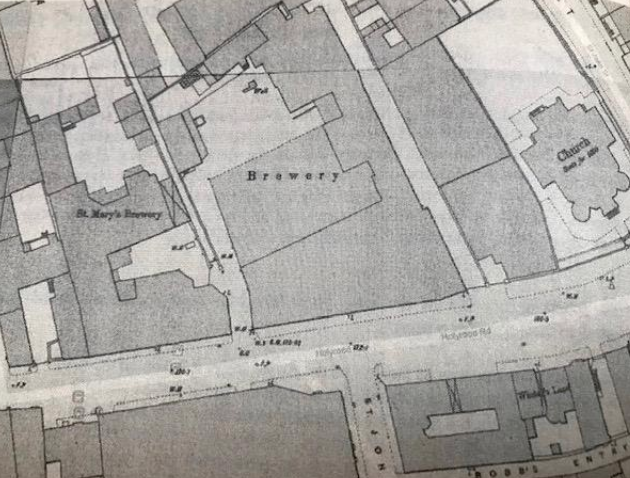
6. Roll out the Barrel
In 2013 James Rafferty wrote an article for the SBAA Journal, titled ‘The life and times of a Wort Runner’. In the article James mentions that he remembers men rolling barrels on Holyrood Road. At the time I could not think why barrels were being rolled from one side of the road to the other. Six years later I discovered the answer in Ron Pattison’s book on Scottish beers. The following is an extract that explains all.
In 1959 Aitchison’s brewery in Edinburgh was bought by Hammonds United Breweries and closed in 1961, however they recall the following,
“The beer was brewed on one side and barreled, and then the traffic halted whilst it was rolled over to the keeping cellar on the other; the cellarmen were often quite nonchalant about this practice and sometimes would maneuver barrels between the moving traffic”.
The map shows the location of Aitchison’s brewery.
James, I should never have doubted you.
John Martin
